Book contents
- Frontmatter
- Contents
- Figures
- Tables
- Preface
- Acknowledgments
- 1 Matters of Life and Death
- 2 Evolution's Visible Hands
- 3 Hunting and Fishing
- 4 Eradication
- 5 Altering Environments
- 6 Evolution Revolution
- 7 Intentional Evolution
- 8 Coevolution
- 9 Evolution of the Industrial Revolution
- 10 History of Technology
- 11 Environmental History
- 12 Conclusion
- Note on Sources
- Glossary
- Notes
- Index
8 - Coevolution
Published online by Cambridge University Press: 05 June 2012
- Frontmatter
- Contents
- Figures
- Tables
- Preface
- Acknowledgments
- 1 Matters of Life and Death
- 2 Evolution's Visible Hands
- 3 Hunting and Fishing
- 4 Eradication
- 5 Altering Environments
- 6 Evolution Revolution
- 7 Intentional Evolution
- 8 Coevolution
- 9 Evolution of the Industrial Revolution
- 10 History of Technology
- 11 Environmental History
- 12 Conclusion
- Note on Sources
- Glossary
- Notes
- Index
Summary
The idea of coevolution originated in evolutionary biology to describe the process by which pollinators and plants developed traits that seemed to suit each other astonishingly well. Why is the tongue of the hummingbird just long enough to reach the nectar in a flower, and the flower tube just long enough to force the bird's head to bump into pollen grains that the bird transfers to the next plant it visits? The idea emerged that the two species continually evolved in response to each other; biologists dubbed this process coevolution. If hummingbirds evolved a longer tongue that enabled the head to avoid contact with pollen, they created a selective advantage for plants with longer-tubed flowers that forced hummingbirds to brush against pollen stalks once again. Longer flower tubes created a selective advantage for birds with longer tongues, and so on, with flower tubes and bird tongues both lengthening over time.
This chapter argues that populations of people and of other species have coevolved; that is, a human population has caused changes in the traits of a population of another species, and those changes have in turn reshaped traits in the human population, and so on. Because we have been emphasizing genetic evolution so far in this book, I will start out with examples involving the evolution of two genetic traits of human beings: light skin and lactose tolerance. Then I will turn to another way of thinking about evolution and coevolution that involves culture.
- Type
- Chapter
- Information
- Evolutionary HistoryUniting History and Biology to Understand Life on Earth, pp. 85 - 102Publisher: Cambridge University PressPrint publication year: 2011



